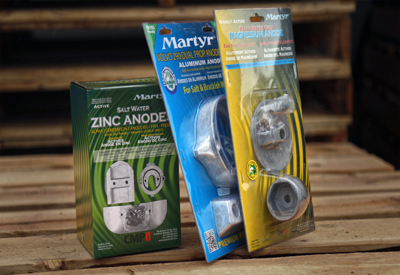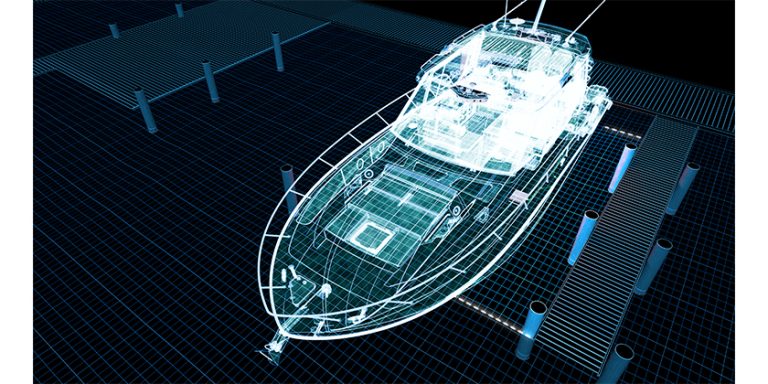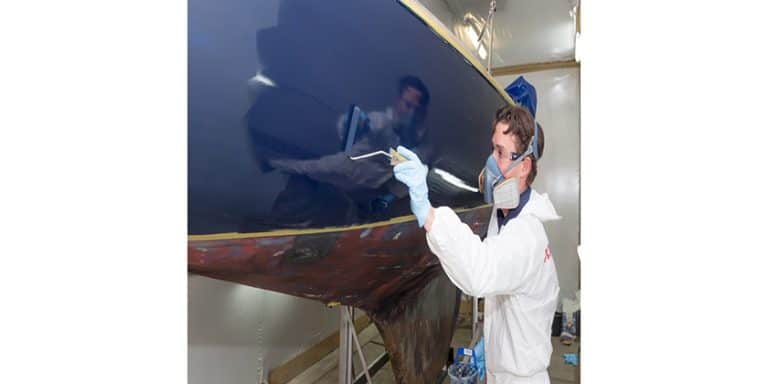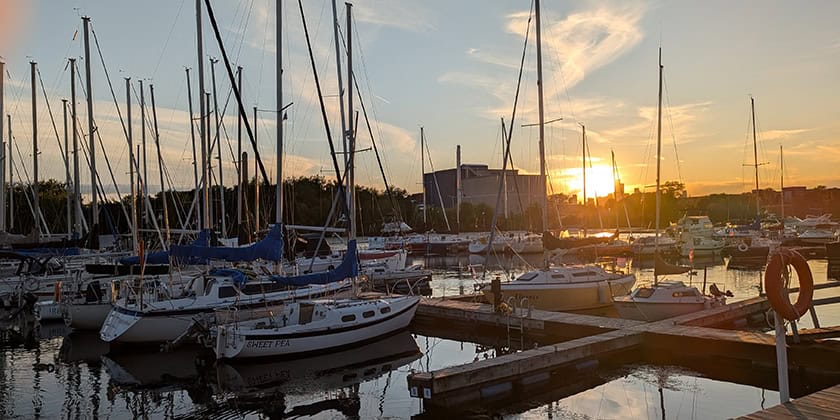Time To Sink Zinc

For years, we’ve all used zinc anodes to protect our engines and other metallic parts from corrosion, but growing evidence of its long-term toxicity has brought zinc under the microscope. With newer alternatives proving to be more effective and less expensive, why do we keep buying the stuff?
By Craig Ritchie
Most of us don’t give a second thought to our sacrificial anodes – those curious knobs of raw metal found on outdrives, shafts, rudders, and other metal components that dangle under the boat. We know that the anodessomehow react in the water to protect those important metal bits from corroding, and we know that every now and then, over time, they will dissolve in the course of doing their job and need to be replaced. But that’s about it. Beyond that, no one really gives them a second thought.
Maybe we should.
Anodes are actually pretty cool devices. Metal corrodes in water as a result of naturally occurring electro-chemical reactions. Anodes are made from metals that have a particularly attractive electro-chemical voltage range, so these corrosive reactions tend to concentrate on the anode while ignoring other adjacent metal parts. It’s a bit like catering a kid’s birthday party by serving cake and broccoli at the same time – the cake gets devoured while the broccoli escapes untouched. It’s a simple approach that works equally well on small boats, large yachts, commercial ships, and shoreline installations such as docks and lock gates.
 Anodes have traditionally been made of zinc – to the point they’re pretty well known universally as “zincs” rather than by their proper name. While zinc is an effective anode material, and small amounts of zinc are essential for human health, in higher concentrations it can cause real problems. Prolonged exposure to zinc has been found to be highly toxic to plants, invertebrates, and fish, for example. Worse still, zinc anodes typically include some amount of cadmium, which has been associated with serious illnesses including kidney disease, atherosclerosis, hypertension, and cardiovascular diseases. Further, there is growing concern that exposure to cadmium may be linked to immune system deficiencies, with recent studies revealing a significant correlation between cadmium exposure and the occurrence of disease in human populations.
Anodes have traditionally been made of zinc – to the point they’re pretty well known universally as “zincs” rather than by their proper name. While zinc is an effective anode material, and small amounts of zinc are essential for human health, in higher concentrations it can cause real problems. Prolonged exposure to zinc has been found to be highly toxic to plants, invertebrates, and fish, for example. Worse still, zinc anodes typically include some amount of cadmium, which has been associated with serious illnesses including kidney disease, atherosclerosis, hypertension, and cardiovascular diseases. Further, there is growing concern that exposure to cadmium may be linked to immune system deficiencies, with recent studies revealing a significant correlation between cadmium exposure and the occurrence of disease in human populations.
Such findings have inevitably raised concerns about the continued use of zinc anodes in marine environments. South of the border, bans on the use of zinc anodes have been proposed in California and Maryland afterstudiesidentified high levels of the element in local environments located near large marinas. With our shorter boating season,there so far haven’t been specific calls for zinc bans here in Canada, but some feel it’s only a matter of time as the evidence against its use continues to mount.
 Zinc Alternatives
Zinc Alternatives
Fortunately, zinc isn’t the only game in town when it comes to protecting our boats. Non-toxic alternatives exist, starting with aluminum.
Aluminum anodes have numerous advantages over zinc, starting with being far more effective. In fact, aluminum’s superiority to zinc as an anode material is so overwhelming that it has completely displaced zinc as the number one choice of engine manufacturers worldwide.
“All of the engine manufacturers now put aluminum anodes on their product,” says Szwez . He should know, since CMP makes anodes for virtually every major engine builder in the marine industry. “Mercury, BRP, Honda, Suzuki, Yamaha, Volvo Penta – all of them use aluminum. It’s by far the most effective anode material there is.”
 The greatest benefit to aluminum over traditional zinc is that modern alloys simply allow aluminum anodes to do a better job of reacting in the water to focus corrosion on themselves. Beyond that, aluminum anodes last up to 50 percent longer than zinc anodes of comparable size. Aluminum is also much lighter in weight than zinc, and most importantly, it’s completely non-toxic. There really isn’t a down side, which is why aluminum anodes are considered to be a premium product compared to the old-style zincs.
The greatest benefit to aluminum over traditional zinc is that modern alloys simply allow aluminum anodes to do a better job of reacting in the water to focus corrosion on themselves. Beyond that, aluminum anodes last up to 50 percent longer than zinc anodes of comparable size. Aluminum is also much lighter in weight than zinc, and most importantly, it’s completely non-toxic. There really isn’t a down side, which is why aluminum anodes are considered to be a premium product compared to the old-style zincs.
Ironically, the greater life span of aluminum anodes has led to sales resistance when boaters come to buy replacements. “Aluminum doesn’t erode anywhere near as quickly as zinc does, so customers look at the anode and think it isn’t working,” says Szwez. “If anything, we haven’t done a good job of communicating the fact that aluminum anodes simply last longer.”
The company also needs to do a better job of teaching customers that not all aluminum anodes are the same, says CMP president, John Mitchell. The best anodes are either made from virgin aluminum, or recycled from high-quality alloys that might have been originally used in precision equipment or as high voltage power lines.
“It’s one thing to repurpose premium alloy, and quite another to melt down low-grade scrap,” says Mitchell.“It sounds unbelievable, but there are suppliers out there who buy old, used-up anodes from shipyards, melt them down, then sell them right back to the same shipyards they sourced them from. No one is any the wiser until the next haul-out, and that’s when the finger-pointing starts. We sell anodes to a number of buyers around the world including military customers, so we adhere to a strict ISO 9001 Quality Management System, and our alloys are chemically tested constantly, so they’re guaranteed to meet the most stringent specifications. Otherwise, without some sort of third-party quality certification, how do you know what you’re getting?”
CMP applies the same quality focus to its magnesium anodes, which providean even more effective option for boats that operate strictly in fresh water. Magnesium offers an extremely active electro-chemical voltage range, giving it a substantial protection edge that surpasses that of zinc and even aluminum.
“In fresh water, nothing beats magnesium,” notes Szwez. “We don’t recommend magnesium in saltwater environments because it’s too effective, to the point it dissolves and disappears in such a short time it could leave the hull temporarily unprotected if the owner doesn’t notice. In saltwater, it dissolves like an antacid tablet. But in freshwater, it’s far and away the best protection you can get.”
 Both aluminum and magnesium not only out-perform traditional zinc anodes, but they’re also less expensive. The cost of zinc has increased substantially in recent years, rising from a level of approximately US$0.70 per pound in December 2015, to approximately US$1.44 per pound today. “Zinc costs have basically doubled,” says Szwez. “Beyond that, it’s a heavy material so warehousing is a pain, and the shipping costs are enormous. You could probably justify the expense if it was a premium product, but it isn’t. Aluminum and magnesium are both much betteralternatives, and they’re both less expensive.”
Both aluminum and magnesium not only out-perform traditional zinc anodes, but they’re also less expensive. The cost of zinc has increased substantially in recent years, rising from a level of approximately US$0.70 per pound in December 2015, to approximately US$1.44 per pound today. “Zinc costs have basically doubled,” says Szwez. “Beyond that, it’s a heavy material so warehousing is a pain, and the shipping costs are enormous. You could probably justify the expense if it was a premium product, but it isn’t. Aluminum and magnesium are both much betteralternatives, and they’re both less expensive.”
So, non-toxic alternatives work better than zinc, last longer than zinc, and cost less than zinc. Why on earth do we keep using the toxic stuff?
Getting the Word Out
Szwez notes that although CMP has sold non-toxic anodes for a long time, zinc continues to represent about 60 percent of its total anode sales. To help change that, the company has come up with new packaging that he says better communicates the advantages of its premium aluminum and magnesium alternatives. They’re also working with their distribution network to help get the word out.
“The big thing is, we have to let people know there are alternatives to zinc that work better and cost less,” he says. “When a boater walks into the parts counter they just say, I need new zincs, and that’s exactly what they get. We need to change that, and make people aware that they’re not stuck with this stuff.”



























